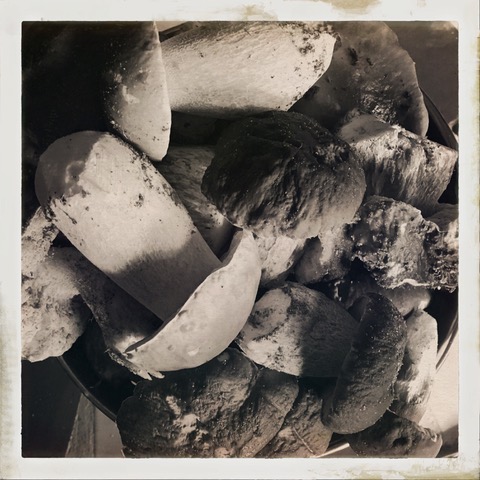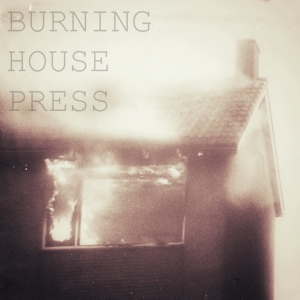Douze, twelve stakes from these Dark Ages
1: At dawn, in the mist, Paola gathers porcini mushrooms, freshly-sprouted on the Landaise forest floor. Earthy clusters. Ash clay-colored caps. Undersides of bright yellow moss. Paola calls them cèpes.
2: In 2012, in a referendum, the British people voted for Brexit. Brexit is an abbreviation for “British exit,” referring to the UK’s decision, in a June 23 2016 referendum, to leave the European Union. The word ‘exit’ was first a C15th theatrical word, meaning a way of departure from the stage. Leave the network.
3: In the kitchen, as I explain to Paola about Brexit, I scrape sand from the porcini. The mushrooms are sturdy, yet surprisingly light. With a small sharp knife, Paola slices the mushrooms thinly, stems and flesh land in a black cast-iron frying pan. The cèpes sizzle in garlic, turn soft in olive oil. “The world is crumbling” Paola tells me.
4: Cèpes, known in English as porcini mushrooms, or penny buns, are hard to cultivate, only grow in the wild. Spring up from a balance of earth, rain and sun. Damp and heat. They form a mycorrhizal relationship with pine trees, a symbiotic relationship with the roots of plants. The mycorrhizal fungi entwine with plant roots, add to plants ability to gather nutrients and water from the soil through the fungus.
5:In the forest, on my phone, on Twitter, illuminated in screen light, I read #RealDonaldTrump sentences, #RealDonaldTrump words: Together, we are Making America safe and Great Again/Wow. In frozen images, I see an American woman’s face in court. Her grimaces. Her frowns. She describes being raped at the age of eighteen. Following these witness accounts, the woman is ostracized, threatened. Cannot return to her place of work. Her home.
6: Up a winding sandy track, in the Landaise forest, we eat porcini mushrooms everyday. They are folded in omelets, stacked neatly inside pies. Ripe and tender, slippery and firm. Beneath a pine tree, in this vast wilderness south of Bordeaux, my four–year-old daughter, Jeanne, whispers, “Maman, we’re inside in a green bubble. Leaves. Oui.” Around us pine trees stretch to the horizon. Arboreal arches. Bends and curves. Above us is sky, a celestial awning. Beneath us are roots. Needles and sand. There are potential mushrooms.
7: Inside her wooden house, Paola speaks, “I feel terrible,” she says, “Last night, I read a book about the world crumbling. Our world crumbling. our system crumbling: ecologically, financially, politically crumbling.” Paola is speaking in French and she uses the verb écrouler, from acrouler, which means to fall into ruins. She changes the subject, holds a porcini in her hand. “Did you know?” she asks, “The word cèpe comes from the Gascon cep “trunk” for its fat stalk from the Latin cippus “stake.” The words stake is related to the word, attach. A stake is what holds things together. In the kitchen, I shove a log on the fire. Wood crackles. Fire burns.
8: On the radio, the Internet, they speak of fires. Everywhere is burning. California fires turn woods to cinders. Fires bigger than houses or hamlets. Fires the size of villages or islands. These fires are the size of small towns. Fires like moving hills. Moving hills of fire. Fires that separate.
9: In the Landaise kitchen, the fire crackles. On the table, are baskets piled high with porcini mushrooms, chestnuts, overflowing with windfall apples. Bruised green. Leather-bright brown. It is the autumn, and the forest is abundant with food. Paola boils the chestnuts and we eat them in the evening dipped in homemade fig jam.
10: In the forest, my three daughters sing, an a cappella version of Thriller by Michael Jackson. In the darkness, their voices harmonize: Jeanne, Olivia and Rose. Sisterly vibrations spring up the night. “Cause this is thriller, Thriller night, And no one’s gonna save you, From the beast about to strike…’”
11: The same day Paola reads the book about crumbling, the Brazilians vote for Bolsonaro to be their President. “Populism is rising,” Paola says, and hands me a plate of mushroom pie. Holding the plate, I think of exclusion, simplification and complexity. It seems populism, scare-mongering and moral panics, ignore and deny access to what is under the ground. The rhizomatic, interdependent roots.
12: In the kitchen, my youngest daughter Jeanne, bites into a porcini, chews and swallows. Then, pointing to the creature on her T-shirt, she declares, “I want to be a unicorn.” Paola smiles. Suddenly, our thoughts are patterned with unicorns: biblical, Greek, Medieval mythological beings, painted and sewn. Symbols of purity. Displayed on Jeanne’s chest. Transformed into sequins. Rainbow sparkles. Echoing light. The unicorn is a healer, a horse alchemist. It makes polluted water pure. As we sit around the table, inside the forest of our lives, the unicorn is galloping. It is running, horn forward, rising through time, across fires and screen light, charging through our Dark Ages.

Susanna Crossman is a British writer based in France. She has just been nominated for Best of The Net 2018 for her non-fiction essay, The Nomenclature of a Toddler. Co-author of the French novel, L’Hôpital, Le dessous des Cartes (LEH), she has recent/upcoming work with Repeater Books, 3:AM Magazine, The Creative Review, Litro, ZenoPress and elsewhere. Her writing has been short-listed for the Bristol Prize and Glimmertrain. She regularly collaborates on international hybrid arts projects, currently, Morning 360°, an experimental film, with American composer Michael Dickes and Spanish photographer Juanan Requena. She is represented by Craig Literary, NY. More at: https://susanna-crossman.squarespace.com. Susanna tweets here: @crossmansusanna
images: Susanna Crossman


Leave a comment